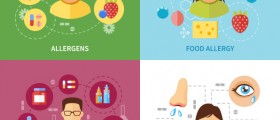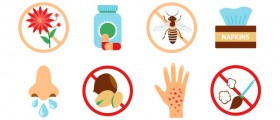
It is not uncommon for people to become allergic to specific types of drugs, even though the reactions of every individual in these situations are quite unique. Namely, some people may experience minor health issues related to drug allergies, while others may risk their lives after taking the same medication.
Either way, this form of allergy, like all other forms, takes place once our organism starts considering some harmless substances as harmful, overreacting to their presence in our body through various symptoms, some of which are skin eczema, rashes etc.
Drug Allergies Can Be Problematic
Out of many types of drugs which can trigger adverse effects, penicillin and similar antibiotics, Aspirin and other non-steroidal anti-inflammatory medications, anticonvulsants, monoclonal antibody therapy and chemotherapy are the most common ones.
Note that rubbing the drug onto the skin or injecting it in the body are actions which make you more prone to drug allergies. Thus, it is safer to take medications orally.
As for the symptoms of drug allergies, tongue swelling, coughing, skin rashes, itching and breathing problems are the most common ones. In some situations, usually when proper treatment for drug allergies is not administered timely, people may suffer from anaphylaxis, experiencing swelling, hives, decrease in their blood pressure and shock, even though the latter symptom does not take place often.
Subsequently, if you notice these symptoms affecting you, seek medical assistance as soon as possible. Upon visiting your doctor, he/she might ask you questions related to the onset of your symptoms, the characteristics of the symptoms, the amount of time you have been exposed to signs of drug allergies and the medications you have taken recently.
Knowing what to expect, prepare these answers for your doctor and do not fail to mention any over-the-counter drugs you have been taking, as well as the prescribed ones.
Guidelines on How to Avoid Drug Allergy
The best possible step to take, in cases of drug allergy symptoms is to contact your health provider, especially if the problems you are experiencing are serious. For example, noticing signs of anaphylactic shock should motivate you to take action immediately.
Usually, the doctor will diagnose you and try to find alternative medications which will not lead to allergic reactions in your case. On the contrary, the doctor may decide to expose you to smaller amounts of the problematic drug, making you immune to it over a longer course of time.
Even though drug allergies are related to various factors, one of which is genetics, staying away from the harmful medications is commonly necessary in order to prevent the allergic reactions from happening. However, this can be difficult since most people do not know that they are allergic before the initial allergic reaction affects them.
Bear in mind that most of these allergies will initially appear in a form of rashes. Thus, any persistent and itchy rash may be a sign of a drug allergy. If the situation is far more serious, however, the symptoms are bound to become more severe too, manifesting through nasal congestion, increase in pulse, decrease in blood pressure, presence of dizziness and lightheadedness and facial swelling.
In this situation, resembling the anaphylactic shock, you are advised to seek medical assistance immediately, since you might die in a matter of minutes if you fail to receive adequate treatment.
If you are allergic to a specific drug, choosing a different one may not be so easy, due to the fact that similar drugs may lead to the same effects.The goal, therefore, is to locate the exact drug behind your allergic reaction and discontinue its use. Yet, this can prove to be harder than one might presume, especially in cases where certain cosmetic products such as soaps, detergents or some other substances of this type are causing the allergy. In these situations, like in all others, seeking timely medical assistance is highly recommended.
Antihistamine decreases the itching and the swelling, along with some other symptoms of allergies while corticosteroid creams deal with the swelling and the itching. If the condition you are suffering from is a serious one, you will likely be given Prednisone, or some other corticosteroid tablets.
In cases of anaphylactic shock, emergency injections need to be administered in order to save a person’s life. These injections usually contain adrenaline, mixed with fluids, being injected directly into the veins of the sufferer.
All in all, there are many steps you can take once you notice some of many symptoms of a drug allergy. Nevertheless, it is best to seek medical assistance before taking any other steps on your own. Do not risk taking some other medications in order to help yourself or trying to find some alternative treatment for your condition on your own. This can be counter-productive leading to worsening of the problem. So, discontinue the use of any medications you might be taking and contact your doctor as soon as possible.

















Your thoughts on this
Loading...